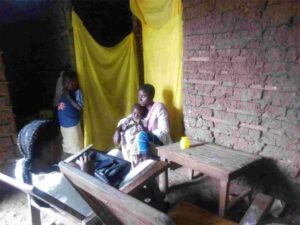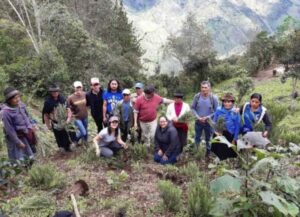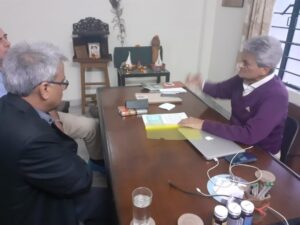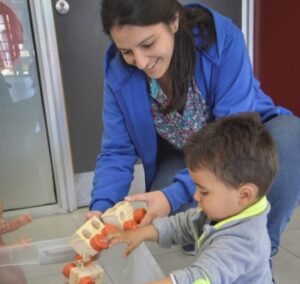INTERNATIONAL DAY OF RURAL WOMEN: Salesian Missions highlights programs that support and empower rural women

(MissionNewswire) Salesian Missions, the U.S. development arm of the Salesians of Don Bosco, joins humanitarian organizations and countries around the globe in honoring International Day of Rural Women, which is celebrated each year on Oct. 15. This day, which was first established in 2008, recognizes “the critical role and contribution of rural women, including indigenous women, in enhancing agricultural and rural development, improving food security and eradicating rural poverty.”
UN Women noted, “Structural barriers and discriminatory social norms continue to constrain women’s decision-making power and political participation in rural households and communities. Women and girls in rural areas lack equal access to productive resources and assets, public services, such as education and health care, and infrastructure, including water and sanitation, while much of their labor remains invisible and unpaid, even as their workloads become increasingly heavy due to the out-migration of men.”
Salesian missionaries living and working in more than 130 countries around the globe are focused on achieving gender equality through programs targeted specifically for young women and girls. These programs strive to empower young women and girls by providing opportunities for education and training that lead to livable wage employment.
“Salesian missionaries around the globe empower rural women through education and ensuring that they have equal access to social programs and skills training,” said Father Gus Baek, director of Salesian Missions. “Women who are able to access skills training and are supported are more often able to achieve financial independence and make better and healthier choices that affect not only themselves, but their families and communities as well.”
In honor of International Day of Rural Women, Salesian Missions is proud to share some of its programs that empower rural women.
DR CONGO

The Don Bosco Center has helped 20 groups of women participate in savings and credit activities in villages in the Democratic Republic of the Congo.
The Don Bosco Center, located in the city of Bukavu in the eastern region of the Democratic Republic of the Congo*, is supporting women who wish to join women’s groups run by the Association Villageoise d’Epargne et Crédit (AVEC), an association for savings and credit in the villages. Since July 2018, the Don Bosco Center has helped create 20 groups of women, mostly mothers.
Every week, the women deposit 1,000 to 5,000 Congolese Francs (CF), which is roughly 60 cents, into the group’s safe, in addition to depositing another 200 CF in the solidarity fund. After a few weeks, the group members can apply for credit and receive up to 10,000 CF to help in situations of necessity such as the birth of a child, an illness or a death in the family.
The women in the groups often have great ideas and projects, but they need help to start or strengthen their activities. Many of the mothers live in difficult situations and have problems related to their children’s health, food and school.
ECUADOR

Salesian missionaries in the indigenous community of Salinas de Guaranda in Ecuador have launched two new projects to help the local economy and provide economic opportunities for indigenous women.
Salesian missionaries in the indigenous community of Salinas de Guaranda in Ecuador have launched two new projects to help the local economy and provide economic opportunities for indigenous women. The first project is a factory for herbal teas and essential oils, which will impact 120 indigenous women.
The second project is focused on strengthening the production chain of aromatic plants. It includes a new production plant facility and workshops. This project will help support 200 women. These two projects have been made possible through the support of the government of Andalusia, Spain, and the Spanish Salesian organization Solidarity Don Bosco.
Staff with Solidarity Don Bosco visited Ecuador for the inauguration of a new production plant facility. Close to 150 women, who are participating in the program and are involved in plant cultivation, also came to the event in Salinas. The event was also attended by local authorities and residents.
For more than 20 years, Salesian missionaries in the region have been facilitating projects that help the most disadvantaged groups, including the creation of solidarity economy production companies. One of these companies is the brand El Salinerito, which markets many fair trade products.
INDIA

The Salesian College Sonada has entered into a new partnership with Rimpocha Tea, based in Siliguri, India, to provide vocational training for adolescent girls in the area who are at risk of exploitation and human trafficking.
The Salesian College Sonada has entered into a new partnership with Rimpocha Tea, based in Siliguri, India, to provide vocational training for adolescent girls in the area who are at risk of exploitation and human trafficking.
The Salesian College was founded in 1938 and is located in the village of Gorabari. More than 95 percent of its student population comes from the hills of Darjeeling, a region known throughout the world for the quality of its tea leaves. In the Darjeeling District, there are currently 83 tea farms covering an area of about 19,000 hectares. These tea farms provide stable employment for more than 52,000 people.
The area faces challenges with people migrating from rural regions in search of a better life in more populous areas, which also puts people, especially girls, at risk of human trafficking. Compounding the problem are the low wages provided to those working in the tea industry. Many leave in search of better paying jobs.
Local organizations working to prevent trafficking estimate that more than 400 girls are trafficked every year from tea gardens, mostly from those gardens that have stopped functioning. Traffickers first look for their victims where hunger and poverty are higher, rather than areas were businesses are stable and there are more opportunities for higher education and health care facilities.
URUGUAY

In Uruguay, the Mamma Margherita Mother and Child Care Center,in the Ituzaingó neighborhood, continues to find ways to support families even at a distance.
The Mamma Margherita Mother and Child Care Center, which is part of the Domenico Savio Institute in the Ituzaingó neighborhood in Uruguay, had just opened five months prior to the coronavirus pandemic. While regulations won’t allow the Salesian child care center to accommodate children and their families onsite during the quarantine, the team of educators continues to be attentive to their multiple needs.
During normal operations, the center served 108 children (1-2 years old) and their families. In addition to the care and educational programs provided, all were offered food, including breakfast, lunch and afternoon snacks, as well as snacks for children staying eight hours.
The staff at the center has continued to find ways to support these families even at a distance. Coordinator Camila Gil said, “From Monday, March 16 on, following regulations, we stopped taking care of the children in the center and started reaching out to the families by telephone. From these calls, we learned that some parents have lost their jobs or started having health problems. In cases where we have identified the greatest need, we have supported them with food, first by supplying them with the food cooked in the day, and then by delivering baskets of dry food, fruit and vegetables. Through WhatsApp, we also send information on social benefits, prevention measures, and emergency numbers in case of health problems or violence.”
###
Sources:
ANS Photos (usage permissions and guidelines must be requested from ANS)
UN Women – International Day of Rural Women
*Any goods, services, or funds provided by Salesian Missions to programs located in this country were administered in compliance with applicable laws and regulations, including sanctions administered by the U.S. Department of Treasury’s Office of Foreign Asset Control.




